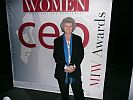
I joined Unisa 32 years ago, and was the first South African born woman to become a Professor in Theology. That was in 1990. I received the award for the projects in which I engage in the Research Institute for Theology and Religion here at Unisa. These projects focus on the influence of religious discourses on the lives of people in vulnerable communities, such as farm workers, prisoners, victims of domestic violence, HIV infected and affected people, and the youth. In these projects there is a special emphasis on the vulnerability of women. The prize was awarded not only for the research done, but for my involvement in educating and training people in vulnerable communities. All my research projects have a development and training component attached to them. I also engage in Short Learning Programmes here at Unisa to train church leaders as well as the laity, programmes I want to expand in due course since I feel passionately about community education.
I was informed by the organizers in February of this year that I have been nominated.
There were 700 nominations for 20 categories. I was nominated for “Education and training”. Of the 700 nominees 61 candidates were elected by a panel of 12 judges on the grounds of their biographies, that is, three candidates per category. They were then invited to do video interviews where they all answered the same questions. These video interviews were presented unedited to the judges. At the Awards Ceremony at Gallagher Estate on 30 July, the winners in each category were announced. Incidentally, there eventually were 4 nominees in my category instead of three.
I was totally astonished, since the women nominated in my category really were heavy weights. But since community education is my passion, as said above, I was so encouraged, I wanted to change the world after the announcement! (If only I could!)
Again, this is my 32 year at Unisa. I was appointed in the Department of Church History while I was still a student. In 1996 the University Council created a post at the Research Institute for Theology and Religion with specialization in religion, gender and oral history. Since then, I have worked at the RITR where wonderful opportunities for research exist, loving every moment of it. Since I started studying Theology straight after matric I have obtained 7 degrees, all with distinction, of which 2 are doctoral degrees. These doctoral degrees are in Church History and in Practical Theology. I obtained my second doctorate after doing counseling at Kalafong Hospital part time for 7 years. My thesis was published under the title “Township spiritualities and counseling” (2009).
All the research projects I run with farm workers, women, HIV infected and affected, etc are community engaged. The projects engage the community itself in doing the research, and leave behind skills and structures from which the community benefit. Apart from that I am an ordained pastor in a Zulu-speaking congregation in Dullstroom (Sakhelwe), Mpumalanga. Here I engage in community projects involving schools, Aids hospices, counseling, counseling training, and income generating projects such as bead work, etc.
I believe in the potential of all people. It is wonderful to see people growing when they are empowered, that is, when they are energized through their own potential. I am privileged to be given a part in people’s lives. People are not poor and vulnerable because they are inferior but because they had no chances. It is part of the wonder of being human to be invited into the lives of such people.
I am a double parent to a son who is 22 years old. He has made me strong. If you have never been a parent, how can you understand the vulnerability of life?
Interview with UNISA 's staff journal